Ruben Ávila – an idealist raised on Marxist theory and stern military discipline – proudly followed the call of army paratrooper Hugo Chávez when he launched a coup d’etat in 1992 to try to oust a president they considered illegitimate.
It was Ávila who led the assault on the presidential palace, boldly driving a small tank up the steps, in an incident which provided an iconic image of the ultimately failed coup attempt against president Carlos Andrés Pérez.
“We were seeing the decomposition of the country,” says Ávila, now a retired major, explaining the decision to try to overthrow the government. “Our movement was born to fight against a corrupt unpopular government that was killing the Venezuelan people of hunger,” he said.
They were certainly trying times. Government overspending and falling oil revenue caused massive levels of debt. Poverty, inflation and unemployment rose, while real incomes dropped. Corruption was widespread and blatant, and street crime made Venezuelans feel increasingly unsafe.
That description could well be applied to Venezuela today. Its inflation rate is the world’s highest and many people are going hungry because basic foods are scarce. What food is available is too expensive to buy on an ever dwindling salary. Caracas, the capital, has the highest murder rate in the world.
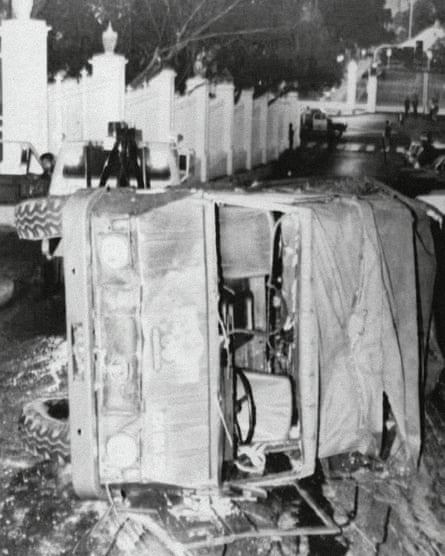
Those are some of the reasons cited by a group of men who on Sunday staged an assault on an military base in Valencia, an hour’s drive away from Ávila’s offices in Morón, making off with a weapons cache. The government said it quashed a rebellion, but the attackers said it was just the first part of a broader plan to bring down the president, Nicolás Maduro.
But Ávila rejects the comparison. The attack on the base “was nothing but a media show” put on by “mercenaries and paramilitaries commanded by a officer who deserted, a traitor and coward linked to the same rightwing that we rose up against.”
Avila, 55, represents the core Chavista loyalists who despite the intense international and domestic pressure placed on the government, remains steadfast their defense of maduro Maduro and the political course set by Chávez, who six years after his failed coup came to power by the ballot box..
Once elected to power in 1998, Chávez launched a series of radical changes in the country under what he called “21st-century socialism”.
Today, with that system in crisis, Ávila is one of the kind of die-hard Chávistas helping Maduro stay afloat amid growing international and national pressure.
‘It will be perfected’
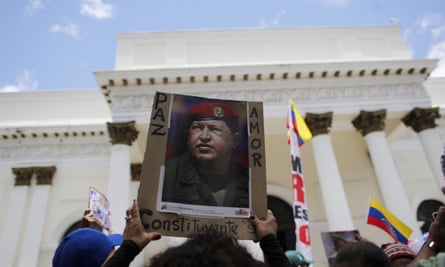
That tension has risen following the election of a constituent assembly on 30 July widely seen as an attempt by the socialist government to gain absolute power. The assembly was sworn in on 4 August despite dozens of countries saying they would not recognize the new super-body that has the power to rewrite the 1999 constitution and supersede all current state institutions.
Ávila was a member of the assembly which drafted the 1999 charter under Chávez’s direction. In an interview with the Guardian, he said the new constituent assembly would not undo the older charter, but rather strengthen it.
“This will not change the constitution that we wrote back then, it will be perfected,” he said in a rare one-on-one interview of a state official by a foreign media outlet. Àvila – who is now the head of Pequiven, a state-owned petrochemicals conglomerate – had to get authorization directly from the country’s vice-president, Tareck El Aissami, in order to agree to the interview.
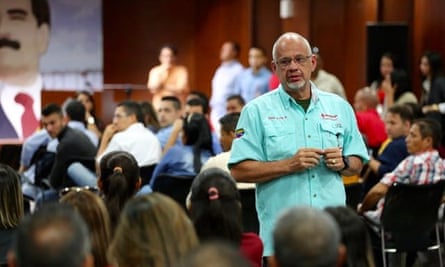
“President Maduro initially called it to sit the opposition down once and for all, for dialogue, to seek points of agreement and a peaceful solution to the situation in the country,” he said.
The opposition, grouped in an alliance of parties known by its Spanish initials as MUD, boycotted the assembly as unconstitutional. Instead they have maintained street protests for four months in which more than 100 people have been killed.
Throughout the turmoil, a growing number of once-loyal Chavistas have distanced themselves from the Maduro government, including the country’s chief prosecutor, Luisa Ortega – who was dismissed in the constitutional assembly’s first act – and former interior minister Miguel Rodríguez Torres, who also participated in the 1992 coup attempt.
Mid-level defectors like those who participated in the attack Sunday will likely lead other sporadic outbreaks, says David Smilde, an analyst on Venezuelan politics for the Washington Office on Latin America. But he doubted whether a wider plot against the government can be successful. “The Maduro government and Cuban advisers are vigilant about any broader conspiracies and they will nip them in the bud,” he said.
Ávila is not discouraged by the defection of some of his former comrades. “Some of them have declared themselves in rebellion against the government of Nicolás Maduro but this has to do with a lack of ideological training, it has to do with resentment, or because they have not been given the opportunities [they thought they deserved],” he said.
Quick GuideWhat's behind the Venezuelan crisis?
Show
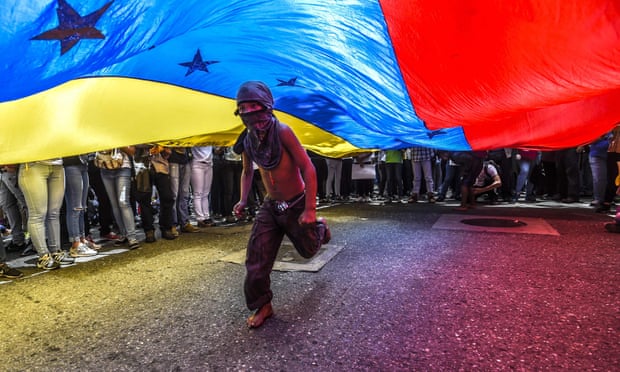
Behind the crisis
A cratering economy and acute shortages of medicine and food, coupled with rising anger at increasingly authoritarian government have contributed to the crisis. The IMF has predicted that unemployment will surpass 25% this year, as the country suffers a third year of recession.Political turmoil
The president Nicolas Maduro won a general election in 2013, on a platform of continuing his predecessor Hugo Chávez's socialist policies of using the country's oil riches to reduce inequality and lift people out of poverty, but falling oil prices have forced the government to curtail social programmes.Recent protests
Recent protest have been sparked by a court decision – later overturned – to strip the opposition-controlled national assembly of powers, and a 15-year ban from public office imposed on opposition leader Henrique Capriles.That does not seem to be his case. Despite his actions during the1992 coup and his close connection to Chávez, Ávila has maintained a low profile as a Socialist party loyalist who believes he is helping to carry on the work of Chávez, who he considers his “mentor”.
The name of his mentor now graces the petrochemical plant in the city of Valencia, which Ávila has presided over since being named the head of Pequiven in January after the previous president was sacked and charged with corruption.
‘Doors are being closed to us all over the world’
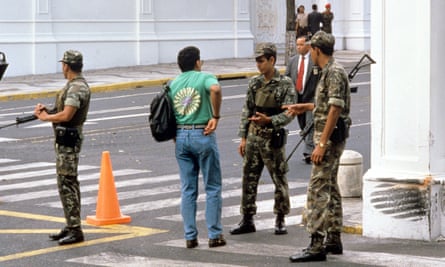
Ávila joined a growing number of current or retired military officers placed at the helm of government ministries and state companies.
Pequiven, which makes fertilizers and basic petrochemicals, has been hard hit by what Ávila, like many government supporters, calls “an economic war” against Venezuela. Critics of the government say much of the economic meltdown is due to simple mismanagement.
When he took charge the company was working at 20% capacity. Today he says it’s up to 60% with the help of Japanese technical advice, although industry associations reckon the real number is between 25% and 35%.
Critics say this and other state-owned companies, such as the oil firm PDVSA, are crumbling under the weight of having to finance social programmes rather than maintaining plants in optimal conditions.
But Ávila says Chávez’s close circle was prepared for this.
When the president travelled to Cuba for surgery on the cancer which eventually killed him, he left with a warning, said Ávila: “He said hard times were coming, and those hard times were related to an true economic blockade and a psychological war which we are living every day.”
In fact, no country has imposed economic sanctions on Venezuela, home to the world’s largest oil reserves, although the US has frozen assets that Maduro and more than a dozen of his closest allies have in the US.
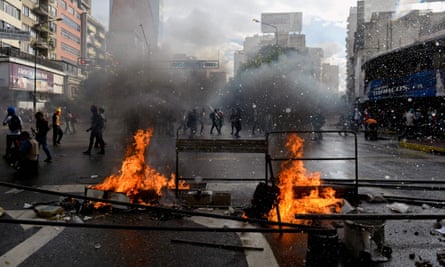
The Trump administration has, however, warned of broader sanctions that could target some parts of Venezuela’s oil industry, which provides 95% of hard currency in the country. The EU has held back from imposing sanctions but said it would consider such measures.
“Doors are being closed to us all over the world,” said Ávila, calling the sanctions “stupid”.
He personally is not worried about any possible individual sanctions against him because he claims not to have any assets in the US. “And the travel restrictions? I don’t care, I don’t like to travel. I will stay here in my country.”
If broader US sanctions come, he says, the country in general and Pequiven in particular would have to find other markets, listing possible buyers and suppliers as Belarus, India, China and Brazil.

Ávila says proudly that 71% of Pequiven’s workforce of 4,700 voted in the controversial election last Sunday. “We did a lot of political work and awareness campaigns with Pequiven workers,” he said.
Before the vote, the human rights group Provea warned that Pequiven workers were among those threatened with being sacked if they did not vote, but to date there have been no reports of actual firings at the plants. Ávila did not say what might happen to the 29% who did not cast their ballots.
It was pressure like that, and what was later revealed to be inflated turnout figures, that led many countries to condemn the assembly and Maduro’s government.
Ávila says that despite the continued commotion in the country, he believes Chávez would approve. He would have said that “we are doing things right, that we are on the right path”.
But he acknowledges difficult days are still ahead. “Venezuela is a country of challenges,” he said.
